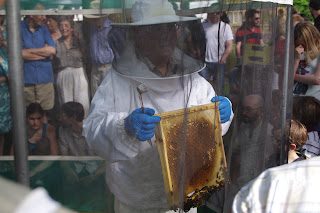I could hear my son’s enthusiastic voice coming from somewhere near the front. He had managed to squeeze through the crowd so he could see, while I stood at the back trying to catch a glimpse of what was going on. There were about a hundred of us gathered around a demonstration beehive in the University of Bristol’s Botanic Garden, listening to the beekeeper talk about maintaining beehives. He’d just pulled out a frame from the hive that was absolutely writhing. We all stepped in for a closer look, and despite having no fear of bees, I have to admit that I was grateful for the mist net that separated us. After all, 15,000 is a lot of bees!
 |
| An audience gathers around the demonstration hive to learn about the art of beekeeping. Photo: Nick Wray. |
Last month, my son and I were on a long walk when we happened upon the annual Bee and Pollination Festival at the Botanic Garden. The festival is a joint effort between the Botanic Garden and the Bristol branch of the Avon Beekeepers Association and this was its 3rd year running. This year, the event also partnered with the Bristol City Council’s Allotments Team, who helped to build a small working allotment on-site to celebrate the event’s theme of vegetable growing and allotments. About 1,000 people visited the gardens over the festival weekend and judging by the faces gathered around the demonstration hive, it was a hit whether you were two or ninety-two.
For my 4-year old, bees mean delicious sweet golden honey. However, for many of us with gardens or allotments, bees have a much greater importance and value in their role as pollinators and the Bee and Pollination Festival was a chance to celebrate this. In the UK, the hard work of pollination is mostly done by insects – bees, butterflies and hoverflies to name a few. Besides our domestic bee, Apis mellifera, the UK has 26 species of bumblebee and 250 species of solitary bee. While we’re at work making a mental list of things that need sorting out in the garden on the weekend, these pollinators are out there doing their thing. In the UK alone, the value of insect-pollinated crops is estimated to be £510 million annually; pollinators perform an extremely valuable ecosystem service that is critical to our future food security.
It’s important to be reminded of the connection between food and insects, particularly when we consider the plight of our pollinators. Bee and pollinator populations are in decline largely due to loss of natural habitat; monoculture crops and well-grazed pastures do not promote the wild flowers that are essential food for our pollinators. Loss of nesting areas, widespread use of pesticides and disease are also taking their toll.
The University of Bristol’s Urban Pollinators Project was on hand at the festival to discuss some of these issues. The project is taking a close look at pollinators in urban environments, surveying pollinating insects in the urban centres of Bristol, Edinburgh, Leeds and Reading. The researchers are comparing the biodiversity of pollinators in urban environments with that in reserves and farmland. They’re also trying to identify urban hot-spots of pollinator biodiversity and look at ways of improving diversity and abundance of pollinators in urban areas.
 |
| The small working allotment built for the Bee and Pollination Festival. Photo: Nick Wray. |
While my son stood entranced at the observation hive, searching for the queen, I also had a chance to check out the Bees for Development stand. If you haven’t heard of them, this is an independent organisation that works largely in Africa and Asia promoting more and better beekeeping to help build sustainable livelihoods in developing communities, while also conserving biodiversity. Among other things, the group helps promote the value of bees as pollinators, linking beekeeping to improved crop yields and profits for farmers and stressing their importance for food security.
We had unfortunately just missed a speaker from Writhlington School’s Orchid Project, but we did meander through the artist exhibits and local nursery displays. We stopped by the Riverford Organic and Butcombe Brewery displays, and of course we couldn’t leave without buying a jar of local honey from the Bristol Beekeepers.
However, the highlight of the day for me was, without a doubt, seeing my son’s face as he wound his way through the crowd to find me and share his unbridled excitement at seeing all those bees. For him, the smell of the smoke, the hum of the bees and the thrill of spotting the queen among thousands of dancing bees was an incredible window into the world of bees. For me, it was a reminder of the many ways we’re connected to insects and pollinators in particular. For both of us, we’ll have fond memories to think back on each time we enjoy some of our local honey.

